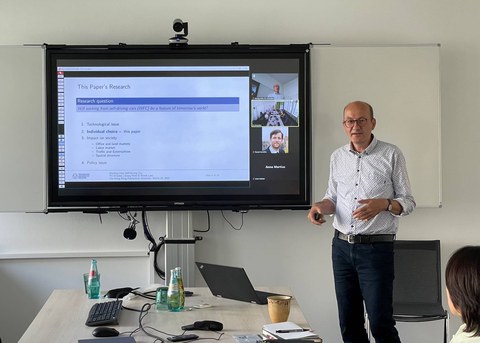Jul 13, 2022
Guest lecture by Prof. Hirte: Working from self-driving cars
Future mobility is changing our lives, everyone knows that. An interesting question would be: will we be able to work remotely in an autonomous vehicle in 20 years, saving commuting time as well as office space? Given the average commute times of 55.2 minutes in the US, 44 minutes in Germany, and 45 minutes in Hong Kong, this would have a significant impact on our daily time use and routine.
Prof. Georg Hirte (Chair of Economics, esp. Transport Policy and Spatial Economics) has conducted research on this question together with Renée Laes (Qucosa - Technische Universität Dresden: Working from Self-driving Cars). He presented the results under the title "Working from self-driving cars" on 30.06.2022 in the RTG expert discussion of the Boysen-TU Dresden Research Training Group.
At the beginning, he presented possible advantages and disadvantages of working in self-driving cars for employers and employees. While companies can save office costs, there are additional costs for the mobile office, whose land costs are passed on to society. Workers can convert unattractive commuting time into working time, reducing the time associated with work each day. In addition, they can convert office time into mobile office time, thus increasing their spatial and temporal flexibility. On the other hand, there are possible disadvantages from the lack of integration into the professional network or problems when working in the vehicle (motion sickness).
Based on this, he presented a decision model on mobile working contracts and the choice of daily working hours in the mobile office. He and his team fed this model with data for the USA and Germany and used a Monte Carlo simulation to calculate probabilities for the choice of mobile work, its scope, and distances traveled. For the topic of future mobility, politics is an indispensable factor, so the influence of politics was also taken into account. The key findings, in his view, are: (1) Mobile work is very likely to be a part of the future world of work. (2) The likelihood of entering into an employment contract with the option of "working in an autonomous vehicle" grows with increasing commuting distance, speed, and private travel costs. (3) On average, about two hours of daily working time will be spent in the mobile office. (4) Overall, more traffic will be generated. And (5), normal transport policy measures such as parking fees, energy taxes, and car taxes have a relatively small impact on mobile working.
Based on the results, Prof. Hirte outlined a number of open research questions. For example, the interdependence of mobile office with home office is still unclear or how the control of working time could be implemented by companies. It is also open to what extent and how shocks and bumps during driving would have to be softened and how this is possible.
The topic has aroused the interest of the professors and the doctoral students. Valuable discussions about potential collaborations and open questions enriched and concluded the guest lecture.
We sincerely thank Prof. Hirte for his far-sighted vision on this interesting topic.

